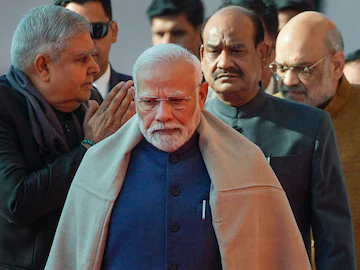More and more Indian companies have experienced financial problems and fraud in the last two years, according to a survey by PwC. About 59% of Indian businesses said they faced these issues recently. This is much higher than the global average of 41%.
A specific problem is procurement fraud, which affects 50% of Indian companies. This is 21% more than the global average. In 2022, customer fraud was the biggest worry for 47% of businesses in India. On a worldwide level, 44% of business leaders say cybercrime is their main concern.
The survey also found that 33% of economic crimes involve corruption and bribery. However, 34% of Indian companies did not check their third-party vendors properly. Only 37% of companies keep a close watch on payments to stop any suspicious activities.
Tag: fgt
-

59% of Indian Companies Face Economic Fraud: A Shocking Survey Insight
-

Parliament Faces Challenges in Passing ‘One Nation, One Election’ Bill
Right now, there’s a big discussion happening in India’s Parliament about a plan called ‘One Nation, One Election’ (ONOP). This plan suggests that elections for the national and state governments should happen at the same time to save money and time.
The voting on this bill is happening in the Lok Sabha (one part of Parliament). Prime Minister Narendra Modi has asked for a special group called the Joint Parliamentary Committee (JPC) to look into this bill and get more people’s opinions on it.
The government’s team is also working hard to explain to everyone the good things about this bill so they can get support from more people. But passing this bill won’t be easy. Right now, the ruling party, the NDA, has 293 members in Lok Sabha out of 543 total seats and 125 members in Rajya Sabha (the other part of Parliament) out of 245 seats. They need a lot of votes to make this bill a reality by the year 2034.
In the past, when they tried to change rules about Article 370 (which allowed certain regions special rights), they had a lot more members supporting them. So, it’s a tougher road for Modi now with the ONOP bill. -

India’s SECI Revamps Power Contracts Amid U.S. Bribery Allegations
A government agency in India that helps promote renewable energy has changed how it gives out power contracts. This change comes after some allegations from the U.S. about bribery in certain deals. The Solar Energy Corporation of India (SECI) helps connect renewable energy producers with power buyers and earns a commission for this service. Recently, U.S. authorities said that bribes were paid to some officials related to solar power contracts, many of which involved the Adani Group. The Adani Group has denied these allegations, calling them untrue. Although U.S. officials have not found any wrongdoing related to SECI, the agency decided to adjust its approach to issuing contracts to lower the chances of corruption.
Now, about 75% of SECI’s new contracts will be based on the actual demand from states, instead of the previous method, which mostly focused on finding suppliers first. This old way, which made up about 90% of contracts, increased the risk of corruption since some producers could influence states into agreeing to deals for power they did not really need.
The source mentioned that SECI hasn’t found any reason to investigate the deals it has been involved with, and no other agency has contacted them regarding this issue. However, the allegations against Adani Group might make foreign investors hesitant about putting money into India’s renewable energy sector. As a result, SECI expects a slowdown in new contracts for the rest of the fiscal year, which ends on March 31. Their goal was to find bidders for 15 gigawatts (GW) of power, but they have only secured about 6 to 7 GW so far. India is still about 10% short of its promise to add 175 GW of renewable power by 2022 and hopes to reach 500 GW by 2030.


